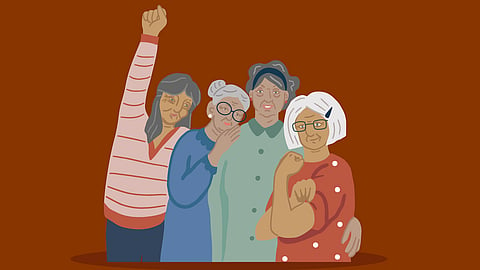What Ouma & her squad of fearsome Aunties taught me about the power of sisterhood
Schooled in the frontline of struggle, their legacy of caring and support lives on.
By Rochelle Barrish
People who know me well, always comment on how I remember everything. Memory of an elephant, they usually say.
A lovely compliment for me, as I simply love elephants because of the sisterhood of the herd, which makes this wild feminist incredibly happy.
My maternal family is definitely a matriarchy. I've always loved my Ouma and her sisterhood. It started with her and the moms on her street and eventually included her daughters.
During the riots of the '70s and '80s, my Ouma and her sisterhood were right on the frontlines with their kids, showing them how to handle themselves when the dogs and the teargas came.
Ouma's squad would wet fabric off-cuts, from the factories they worked at, and hand them to the kids to help with the teargas.
Ouma had a German Shepherd dog named Shiba. Legend has it that she would take Shiba with her to the frontlines. This would confuse the police dogs. As she was commanding her dog, it seemed like the police dogs listened to her as well!
This bunch of feisty aunties were well-known by the cops in their hood. They heard about that great women's march of 1956, led by Lillian Ngoyi, Rahima Moosa, Sophia Williams-De Bruyn, and Helen Joseph. Both groups were unstoppable.
This is the sisterhood into which I was born. I'm eternally grateful for my herd shaping me into who I am today. Many of them are gone, but their love, encouragement, and nurturing endures.
Thanks to this solid foundation, I was able to build my own formidable sisterhood. They hold me and hold space for me. They hype me and celebrate me. They are my cheerleaders.
The first crew to pull in are the first responders. They quietly sit with me.
They allow me to wail and vent or shut down for as long as I need. No judgement, no solutions, no empty platitudes. They just sit with me, making me feel held.
The next crew to pull in are the salvagers, or the hustlers, as I like to call them. They come in once the first responders have stabilised me. They look for things to salvage.
They look at the rubble of my life, listen to what happened and say: hey, this can still be used; that is still intact; this is not too damaged, and I know how to fix that, as the same thing happened to mine.
They salvage everything that can be used to rebuild me or the bits of me that are broken.
Once the salvagers have created heaps of what can be used and what is irreparably broken, the survivors or builders come in. The survivors have been in the trenches. They are mostly my mentors, aunts and friends of mothers or mother figures.
They know all about sitting in the rubble of your life and surviving everything life throws at you. They fear nothing. Knowing they have my back is a massive confidence boost.
Maya Angelou famously said: "I come as one but stand as 10 000". This is what I feel when I think of my survivor crew.
Once I've been stabilised and rebuilding has started, the next squad to show up are the nurturers and cheerleaders. They heal me with food, love, and laughter, reminding me how great I was before this setback.
They make sure my basic needs are met. They help with the admin and heavy lifting, the research, spreadsheets, calls, and meal trains. They make sure that while I get back to full capacity, I have no hard things to do.
They are the buffers and gatekeepers who protect me for as long as I need to be protected.
Once I'm back on my feet, the entire herd arrives, and we have a celebration. We celebrate recovery, healing, and being alive. Once they feel I'm ready to go, they lovingly open the protective circle and let me get back on my way.
I remember the fragile moments. I remember all the celebratory moments. I remember every time I was part of the herd who stepped in or celebrated someone else.
Being a part of my sisterhood means I'm able to stand up straight and tower over my circumstances. And for that I am eternally grateful.
- This article first appeared on the Change Exchange, an online platform by BrightRock, provider of the first-ever life insurance that changes as your life changes. The opinions expressed in this piece are the writer's own and don't necessarily reflect the views of BrightRock.
Read also:

